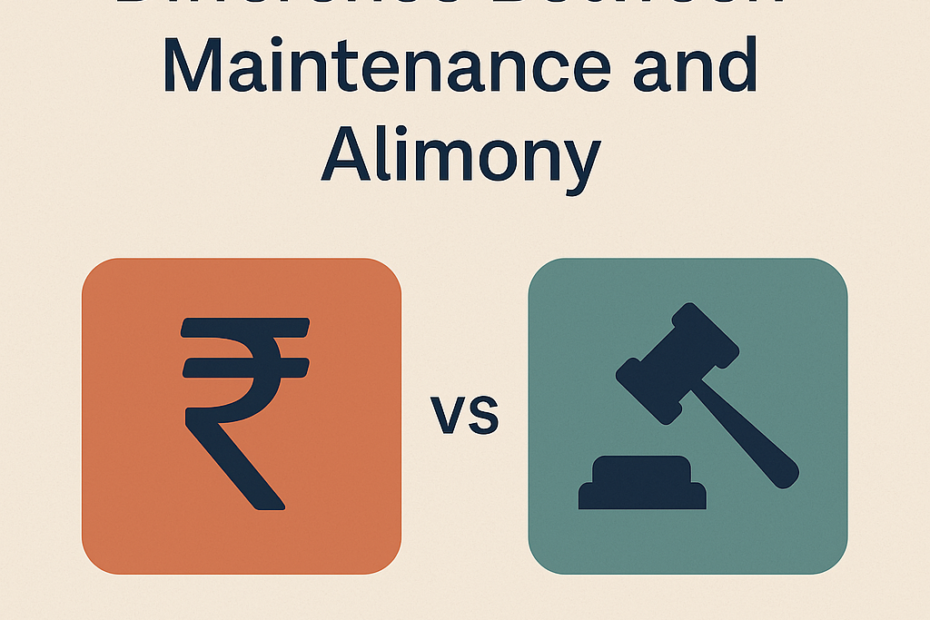Introduction
When a marriage begins to fall apart, financial support becomes a major concern for the spouse who may not be earning or financially independent. In India, the terms “maintenance” and “alimony” are often used interchangeably, but they carry different legal meanings and consequences.
Understanding the difference between the two is crucial for anyone going through separation or divorce. In this article, Advocate Vinod Kumar of LegalMate Law Firm, the best divorce law firm in Delhi, explains the legal nuances, laws, and practical steps involved in claiming maintenance and alimony in India. If you’re looking for a trusted divorce lawyer or divorce law firm, this guide is a great place to start.
What is Maintenance in India?
Maintenance refers to the financial support that a person is legally entitled to receive from their spouse or other family members for basic needs such as food, shelter, clothing, and medical care. It is meant to prevent the person from falling into destitution. Maintenance can be claimed during the subsistence of marriage or after separation, even without divorce.
Relevant Laws for Maintenance:
- Section 125 of the Criminal Procedure Code (CrPC), 1973 – This section provides a quick, inexpensive remedy for wives (including divorced wives), children, and parents who are unable to maintain themselves.
- Hindu Marriage Act, 1955 – Sections 24 and 25 – Section 24 allows for interim maintenance during the court proceedings, and Section 25 provides for permanent maintenance.
- Hindu Adoption and Maintenance Act, 1956 – Section 18 – Recognizes the right of a Hindu wife to live separately and claim maintenance.
- Protection of Women from Domestic Violence Act, 2005 – Section 20 – Maintenance is granted as part of monetary reliefs.
Key Case Law:
- Bhagwan Dutt v. Kamla Devi (1975): The Supreme Court ruled that maintenance under Section 125 CrPC is a social justice measure to protect dependents from destitution.
- Shailja & Anr. v. Khobbanna (2018): The Court held that even if the wife is capable of earning, she may still claim maintenance if she is not able to maintain herself.

What is Alimony?
Alimony refers to a lump-sum amount or periodic payments awarded to a spouse after the legal dissolution of marriage. It is essentially post-divorce financial support, meant to ensure the dependent spouse can maintain a similar standard of living.
Relevant Laws for Alimony:
- Section 25 of the Hindu Marriage Act, 1955 – Provides for lump-sum or monthly alimony after divorce.
- Special Marriage Act, 1954 – Section 37 – Grants permanent alimony to either spouse post-divorce.
- Indian Divorce Act, 1869 (for Christians) – Sections 36 and 37 – Covers alimony rights for Christian couples.
Key Case Law:
- Kalyan Dey Chowdhury v. Rita Dey Chowdhury (2017): The Supreme Court upheld a 25% alimony from the husband’s income.
- Bharat Hegde v. Smt. Saroj Hegde (2004): The Delhi High Court laid down factors like income, status, and duration of marriage for determining alimony.
Key Differences Between Maintenance and Alimony
| Feature | Maintenance | Alimony |
|---|---|---|
| Timing | During separation or legal proceedings | After legal divorce |
| Nature | Monthly/periodic support | Usually a one-time lump sum |
| Legal Basis | CrPC, DV Act, Hindu Laws | Hindu Marriage Act, Special Marriage Act |
| Recipient | Wife, husband, children, parents | Generally spouse only |
| Tax Implication | May be taxable (depends on structure) | Usually non-taxable if lump-sum |
How to Claim Maintenance in India
To claim maintenance:
- File under Section 125 CrPC in the Magistrate Court where you reside.
- Attach documents like marriage certificate, income proof, and bank statements.
- Show that you are unable to maintain yourself and the other party has sufficient means.
Tips:
- Maintenance under Section 125 CrPC is independent of divorce proceedings.
- You can also claim under the Domestic Violence Act or Hindu Marriage Act.
How to Claim Alimony in India
Alimony can be claimed only after divorce is granted.
- File an application under Section 25 of the Hindu Marriage Act (or corresponding laws).
- The court considers several factors:
- Duration of marriage
- Income and assets of both parties
- Age and health of the parties
- Reasonable needs and liabilities
Tips:
- You can opt for a one-time payment or periodic installments.
- The court often encourages mutual settlement through mediation.
